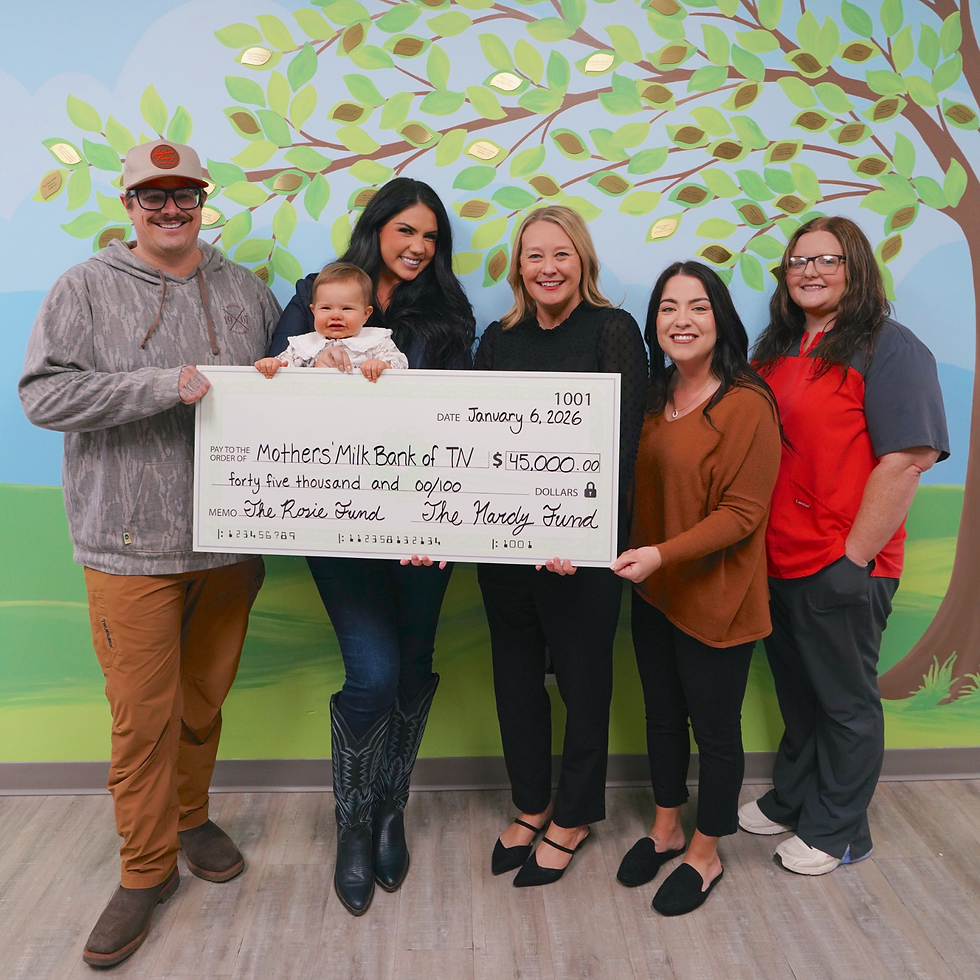Guest Post from Stephanie Attarian, MD
- AmyPainter
- May 4, 2023
- 3 min read

ABOUT ME
My name is Stephanie Attarian and I am wife, mother to three, and neonatologist who also practices Breastfeeding Medicine. I was born and raised in Nashville and am happy to have been back and practicing here for the past five years.
I was very young when I realized I wanted to be a physician although I was unsure what field I wanted to pursue. I felt a natural calling towards children and during my NICU rotation I realized I found the most joy caring for babies. As a neonatologist, I get to care for all types of babies- some with a short stay for some antibiotics all the way to the sickest babies making each day different and keeping my job very interesting. It was during my training to become a neonatologist that I first developed an interest in Breastfeeding Medicine. During our long hours as trainees, we were often the first at bedside to meet parents and answer their questions. Often, those questions centered around babies feeding and helping mothers protect their supply when separated from their babies. Lactation was not available to help at all hours and I quickly realized my medical school education had underprepared me to help. That is when I made up my mind to do additional education in breastfeeding medicine and that has been the most rewarding part of my career! Helping families during one of the most stressful times in their lives is an honor and not a task I take lightly.
THE IMPACT OF DONOR MILK
Donor milk has had a tremendous impact on our patients - we use it like medicine because it is one of the most healing "treatments" we can provide. We care for the smallest, sickest and most vulnerable babies and as such want to make sure they have the most biologically optimal nutrition. We always use mother's milk first but when this is not possible, donor milk is the next best bridge or substitute for mother's milk. In addition to being protective against NEC, a deadly disease, human milk including donor milk helps protect our medically fragile babies from lung disease, sepsis, and retinopathy of prematurity (a common cause of blindness in premature babies) and helps them go home from the hospital earlier, improves their developmental outcomes, and decreases the chance they will be readmitted to the hospital again once they go home. For families, donor milk helps increase parental confidence and provides empowerment. Families feel much better knowing if their milk is unavailable, we have the next best nutrition.
MY EXPERIENCE AS A MILK DONOR
We need more donor milk and I was grateful to have extra to donate. Only humans can make this species-specific milk that contains thousands of enzymes and immune factors to benefit human babies. The process through MMBTN was easy and I would highly recommend anyone who has extra milk to consider becoming a donor. The NICU babies, parents, and medical team appreciate your hard work!
PREVENTING NEC
NEC or necrotizing enterocolitis is a devastating disease of the intestine that causes inflammation which can lead to need for surgery or even lead to death. Sadly, we don’t yet understand exactly what causes NEC and there are probably several causes. While human milk does not completely eliminate NEC, it does protect the babies and reduce their chances of getting NEC. Since human milk is the only way we have found to prevent NEC, we work very hard to provide premature babies with human milk, preferably mother’s own milk or donor milk if her milk is unavailable.
BREASTFEEDING ADVICE
For mothers on the fence about breastfeeding, it is important to make sure the mother has the proper education to make the best decision for her and her family. We focus a lot on the importance of breastfeeding for the babies but often leave out the importance for mothers which includes protection against certain cancers, heart disease, obesity, metabolic syndrome, post partum depression, and missed workdays to name a few. If you are on the fence, please ask talk to someone with formal breastfeeding education and training.
Many NICU mothers find it helpful to set a date to work towards – usually somewhere between 2 and 6 weeks and then evaluate if breastfeeding is something they want and can continue. This can also be helpful for mothers who haven’t decided if breastfeeding is right for them or not. Breastfeeding is never all or none, so any amount of breastmilk babies receive is a gift for them!
When breastfeeding parents face challenges, I tell them breastfeeding is the most “unnatural, natural process” and encourage them to not stop on their worst day - things almost always get better especially with the right support! If you are having issues, remember the cardinal rules of breastfeeding
1. Feed the baby (whatever you need to)
2. Protect your supply (by pumping or stimulating the breast)
3. Get help!




Comments